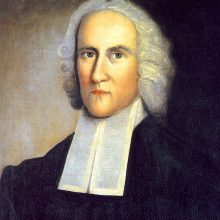Jonathan Edwards

Jonathan Edwards (1703–1758) was an American preacher, theologian, and philosopher, widely regarded as one of the most important figures in early American religious history and a key leader of the First Great Awakening.
Born on October 5, 1703, in East Windsor, Connecticut, Edwards was a child prodigy who entered Yale College at age 13 and graduated at the top of his class. He was deeply influenced by Puritan theology and the writings of John Calvin. Edwards became the pastor of the Congregational Church in Northampton, Massachusetts, where he delivered powerful sermons that emphasized the sovereignty of God, human sinfulness, and the need for personal conversion.
His most famous sermon, “Sinners in the Hands of an Angry God” (1741), is a classic of American religious literature and played a major role in sparking revivalism during the Great Awakening. Edwards also wrote influential theological works, including Religious Affections and The Freedom of the Will, which shaped Reformed theology in America and Europe.
In his later years, Edwards served as president of the College of New Jersey (now Princeton University) but died shortly after taking the position, on March 22, 1758, from complications following a smallpox inoculation.
He is remembered for his intellectual rigor, deep spirituality, and lasting impact on American evangelical thought.
